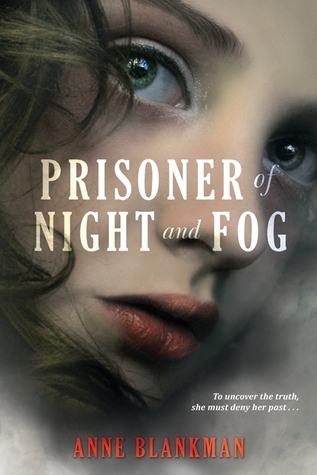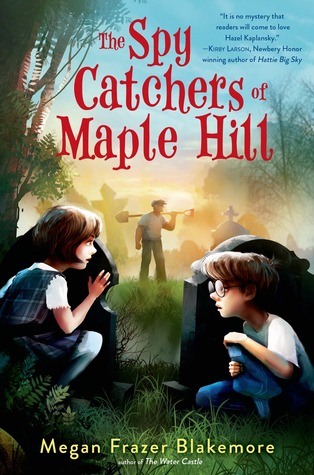
Blankman, Anne. Prisoner of Night and Fog.
April 22nd 2014 by Balzer + Bray
Gretchen lives a fairly decent life in WWII Germany; although her father was killed, he was a martyr for the Nazi cause, and Adolf Hitler is a personal family friend, referred to as "Uncle Dolf". Her mother runs a boarding house to make ends meet, and her brother Reinhard is very unreliable and violent. Gretchen saves a Jewish man from being beat up by her brother and also searches his room, so in retribution, he strangles her beloved cat. Gretchen makes the acquaintance of Daniel Cohen, a Jewis news reporter, who promises to help her find out the truth about her father's death. Even though she has been raised to believe that Jews are horrible, she rather likes Daniel and would rather work with him than her brother. It turns out that her father may have been killed by someone in the National Socialism Party (the Nazis) instead of their enemies, and the clues lead to her father having classified information about Hitler's mental health and uncover unnerving information about her brother's mental health as well. Interestingly, this is labeled as Book #1. I'm not sure where this will go from here.
Strengths: A different twist on WWII, with emphasis on the inner circle of Hitler's group. Many of the characters are based on real ones, and this has good research and lots of details.
Weaknesses: A bit on the long side, and the mystery dragged on a good deal. It seemed like the same discussions were repeated several times, but I read it during testing, so I powered through it.
 Blakemore, Megan Frazer. The Spy Catchers of Maple Hill
Blakemore, Megan Frazer. The Spy Catchers of Maple HillMay 6th 2014 by Bloomsbury USA Childrens
E ARC from Netgalley.com
Hazel has an interesting life in a small town in Vermont in 1954. Her parents run the local cemetery and are a bit lax about supervising her, so she is starting a bomb shelter in one of the mausoleums, stockpiling canned goods in case Joseph McCarthy's predictions of the Russians bombing or invading come true. She is also keenly interested in investigations into communist activity at a local factory, and also suspects the cemetery's grave digger and handyman, Joe, of being a Communist spy. Her best friend has moved away, leaving her to fend off the mean treatment of Connie and Maryann on her own until Samuel arrives. Samuel may be smarter than Hazel, which is endlessly irritating, and has a shadowy past of his own. The two do their best to figure out what spy activity is going on in their town.
Strengths: Like The Water Castle, this had a classic feel to it that many teachers and librarians will enjoy. Hazel is the sort of smart, spunky and somewhat dysfunctional character that goes over well with this demographic. There is certainly a lack of historical fiction set during the 1950s, and I can't think of anything else that covers the concerns of the McCarthy era.
Weaknesses: I'm afraid I am just not vibrating to this author. Hazel was an unlikable character for me, and she seemed mean spirited and without cause in going after the Communists. My students tend to dismiss this sort of manufactured mystery in favor of murder ones. While the historical setting had a lot of good details, there were several anachronisms that bothered me. Students certainly wouldn't pick them up, so it seems a petty thing to mention, but the discussion about the alternate orders of the C.S.Lewis Chronicles of Narnia seemed wrong. My paperback set from the 1970s clearly numbers The Lion, The Witch and the Wardrobe as number one, and I don't remember another order being mentioned until I the 1990s.
I did enjoy the Water Castle, but as I really don't enjoy unsympathetic characters, I'm much less certain about this one.
ReplyDeleteRegarding the order of the Narnia books, my father and his mother argued about this when he was a boy and wrote Lewis. He wrote back, agreeing with my father that reading them in timeline order made more sense. This letter was published in "Letters to Children" & I think only after that were the series published numbered in that order. However, if my father was concerned about the issue in the 50s, I can certainly buy other kids also thinking about it.
Huh. Okay, then. Do others have any thoughts on this? The group I polled were all children of the '70s who were all surprised when another order was considered, but clearly it was of some concern for earlier readers.
ReplyDelete